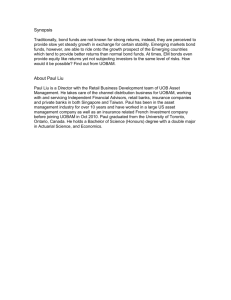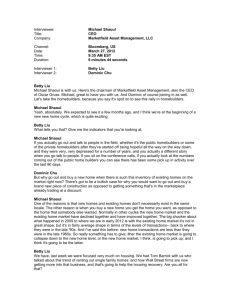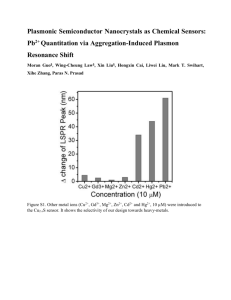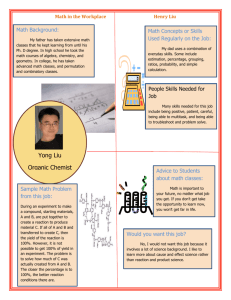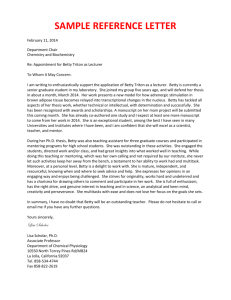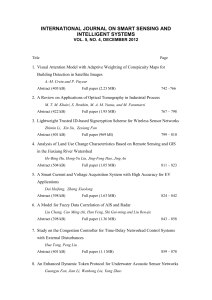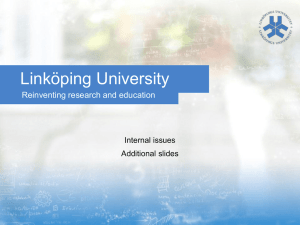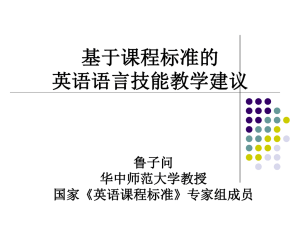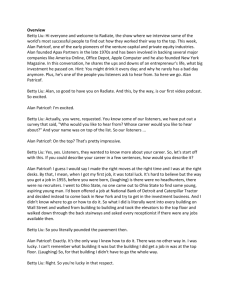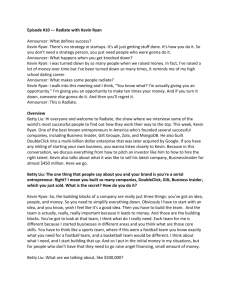Bloomberg TV Interview Transcript
advertisement
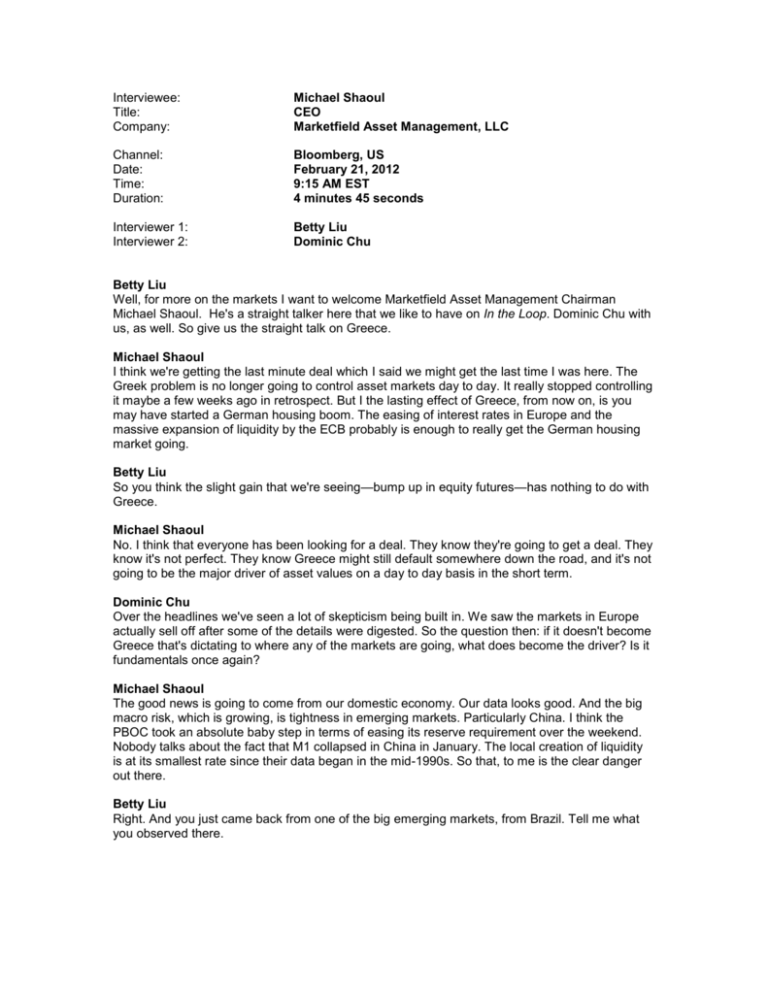
Interviewee: Title: Company: Michael Shaoul CEO Marketfield Asset Management, LLC Channel: Date: Time: Duration: Bloomberg, US February 21, 2012 9:15 AM EST 4 minutes 45 seconds Interviewer 1: Interviewer 2: Betty Liu Dominic Chu Betty Liu Well, for more on the markets I want to welcome Marketfield Asset Management Chairman Michael Shaoul. He's a straight talker here that we like to have on In the Loop. Dominic Chu with us, as well. So give us the straight talk on Greece. Michael Shaoul I think we're getting the last minute deal which I said we might get the last time I was here. The Greek problem is no longer going to control asset markets day to day. It really stopped controlling it maybe a few weeks ago in retrospect. But I the lasting effect of Greece, from now on, is you may have started a German housing boom. The easing of interest rates in Europe and the massive expansion of liquidity by the ECB probably is enough to really get the German housing market going. Betty Liu So you think the slight gain that we're seeing—bump up in equity futures—has nothing to do with Greece. Michael Shaoul No. I think that everyone has been looking for a deal. They know they're going to get a deal. They know it's not perfect. They know Greece might still default somewhere down the road, and it's not going to be the major driver of asset values on a day to day basis in the short term. Dominic Chu Over the headlines we've seen a lot of skepticism being built in. We saw the markets in Europe actually sell off after some of the details were digested. So the question then: if it doesn't become Greece that's dictating to where any of the markets are going, what does become the driver? Is it fundamentals once again? Michael Shaoul The good news is going to come from our domestic economy. Our data looks good. And the big macro risk, which is growing, is tightness in emerging markets. Particularly China. I think the PBOC took an absolute baby step in terms of easing its reserve requirement over the weekend. Nobody talks about the fact that M1 collapsed in China in January. The local creation of liquidity is at its smallest rate since their data began in the mid-1990s. So that, to me is the clear danger out there. Betty Liu Right. And you just came back from one of the big emerging markets, from Brazil. Tell me what you observed there. Michael Shaoul Brazil looks like any economy right at the top. It reminds me of New York in 1999. In Rio de Janeiro, I was joking that they've stopped picking your pockets. They simply send you the check. It's a much more efficient way of extracting dollars out of you. Betty Liu Is that what happened to you? Michael Shaoul No. I certainly got the check. I had a wonderful time. Everybody was very, very nice to me. Betty Liu I know. He's back with a tan. Michael Shaoul Joking apart, Brazil's economy would suffer if Chinese liquidity became a problem. In Brazil itself you seem some signs of tightness where you see credit defaults, debt default by consumers in Brazil are growing pretty quickly, which is very unusual, given where unemployment is. Normally what happens is, an economy turns over, employment gets worse, and people start defaulting on credit. In Brazil the sign of tightness is the credit defaults are accelerating. Betty Liu You were talking about-- you put a report out recently about flows, and flows going into the emerging markets, and how they're not as efficient as they might seem, and what that implies then for the U.S. market. Michael Shaoul What's happened is you’ve had a massive risk-on trade since the beginning of January. And what happens is people go back to what they used to like first, and what they used to like was emerging markets. So the U.S. market has benefited, I would say from benign inflows, sensible inflows, to a market which is well-valued. And emerging markets, it's much more kind of emotional; it's much less discriminating in terms of what you're buying in both debt and equity markets, and that tends to be much worse in the longer term. Dominic Chu Michael, does the speed, the velocity of which the flows go in and out of these markets worry you as an investor or do you have to have that strong constitution, that stomach to be an emerging markets investor? Michael Shaoul The sheer aggregate of flows going into emerging markets should concern you. I look at a market like India, which has had nearly $5 billion of inflows in the first seven weeks of the year. The last time you had flows flying in as quickly as this was the fourth quarter of 2010, which was the last time the market made a big peak. I mean, flows to me look toppy in emerging markets. Betty Liu I think we have a chart here that compares the value of the S&P to the value of a ten-year bond. And what it basically shows is just how cheap stocks have gotten, equities have gotten, compared to bonds. And yet, last month I read volume on the NYSE was at the lowest in thirteen years. So what's the trigger? Why aren't investors getting into the markets here? Michael Shaoul I'm not sure volume means what it used to mean. But I do think the really shocking thing about where we are today is how low yields are given how good the market is. I expected the market to get back to 1350, 1375. I did not expect the ten-year to still be at 2%. And this is the great, kind of, anomaly, and I think it will be fixed by the long end of the curve moving significantly higher. Betty Liu Okay. Michael, great to see you, as always. Michael Shaoul of Marketfield Asset Management. Important Disclaimer Although strenuous efforts are made to ensure the accuracy of interview transcripts, Executive Interviews and its associated companies accept no liability for what is said, for any discrepancy between the spoken and written word, or for any errors and omissions. Where doubt arises, please refer to the original broadcast video interview.
